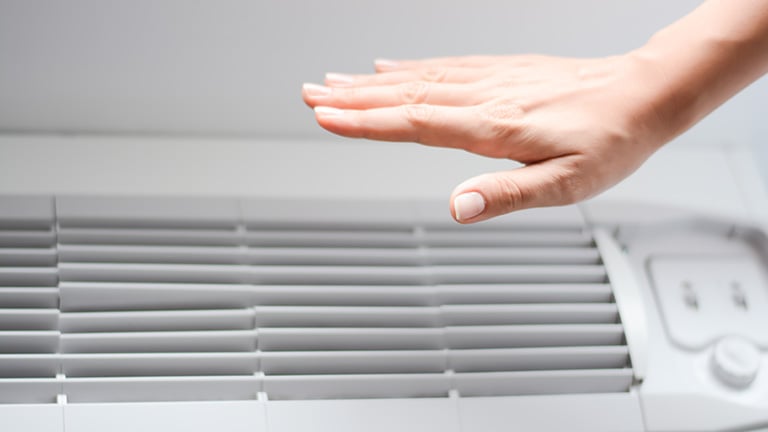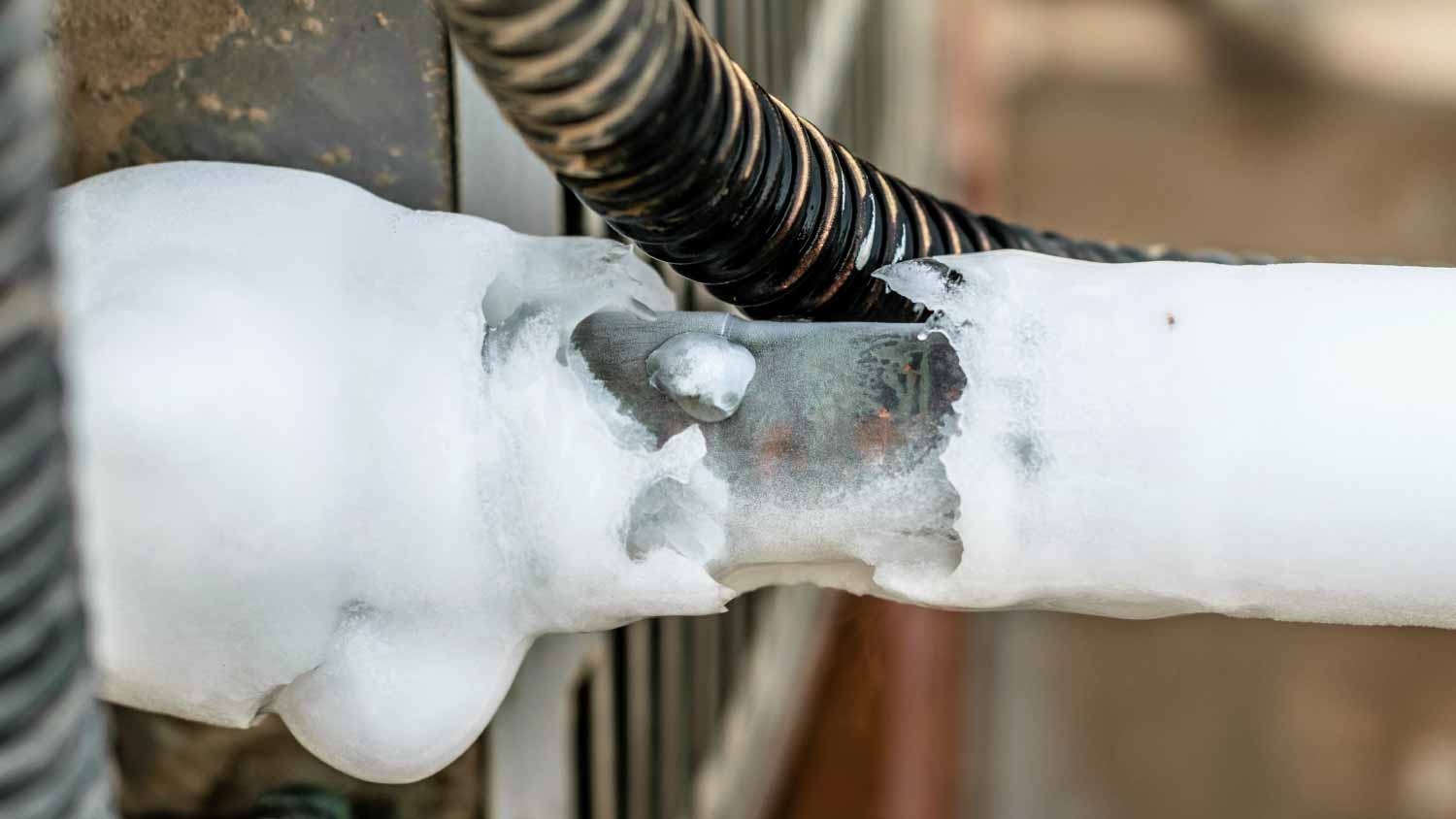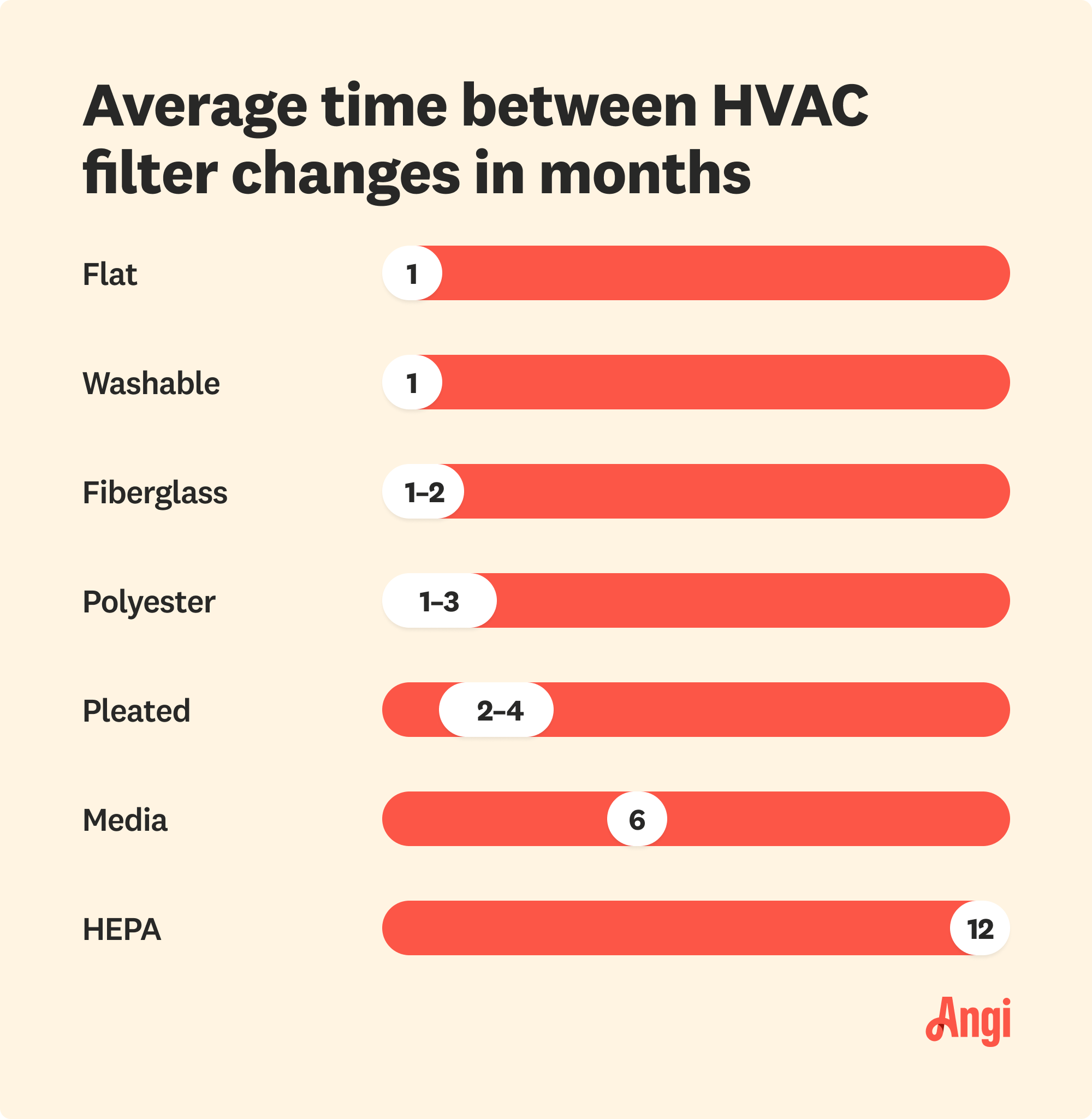5 Reasons Your AC Is Freezing Up and How to Fix It
Your AC doesn’t get stage fright, so it shouldn’t be freezing up


AC repairs cost between $450 and $2,000 on average.
If your AC is freezing up, it could be a dirty air filter or damage to the ductwork.
Leaking coolant can cause the AC’s evaporator coil to freeze up.
The blower fan can break, preventing warm air from flowing.
Clogged drain pans can prevent proper drainage, trapping water that then freezes.
It’s a hot summer day, and despite the thermostat turned down low, it still feels sweltering in your home. When you inspect your air conditioning unit, you might notice your AC freezing up. But how is this possible when the temperatures outside are soaring? There are several potential culprits to consider, each with solutions ranging from easy DIY fixes to challenging repairs that require professional help.
1. Leaking Coolant
To make the air in your home cool, every AC uses a coolant. An AC coolant leak can freeze up your air conditioner because the remaining substance condenses and freezes. While air conditioning professionals can temporarily fix the leak and top off your coolant, it’s time to start budgeting for a replacement.
The Solution
Sadly, an air conditioner that is leaking coolant is an air conditioner that needs to be replaced. It can last you through perhaps one hot summer if you’re in a bind, but expect to pour more money into repairs and extra coolant.
2. Clogged Air Filters

When your air conditioner can’t pull air through the unit, condensation can build up and then freeze, leaving you out of luck on those sweltering days.
Luckily, this is one of the easiest problems to solve, and an ounce of prevention goes a long way to ensure it doesn’t happen again.
The Solution
To get the air moving through your air conditioner again and get that ice gone for good, you’ll need to start by cleaning out your AC’s filter. Consult your manual (or look online) if you aren’t sure where to locate the filter on your unit, but they’re usually in the front panel. Once the filter is cleaned, set reminders to clean it monthly during the hotter months. Keep your AC healthy going forward by hiring a pro to give your unit a checkup every six to 12 months. The average AC tune-up costs between $75 and $200.
3. Damaged Blower Fan
When the blower fan is damaged or faulty, it affects the airflow within the AC unit and prevents warm air from blowing on the condenser coil. Without that warm air, the condenser coil can freeze up, causing the entire AC unit to stop pushing cool air throughout your home.
The Solution
Typically, blower fans stop working properly because of a worn-out motor. You’ll need to replace the motor, if not the entire air conditioning unit. Other parts of the AC unit, including the capacitor, contactor, and the belt, can also break down and prevent the fan from working. If this happens, you can hire an air conditioning repair service near you to replace these parts.
Fans can also stop working if the circuit breaker trips. To check if this is the case, go to the circuit breaker box and flip the switch for the circuit that the AC unit is connected to. While flipping the switch may fix the problem in the short term, if the AC unit continues to trip the circuit breaker, have an HVAC professional take a look as soon as possible to prevent more damage to the system.
HVACs are one of the most complicated and essential systems in our homes. To avoid further damage or safety risks, always hire a certified HVAC specialist to repair or replace broken parts.
4. Damaged Air Ducts
Air travels throughout your home through the air ducts, so if they are damaged or blocked, it can restrict airflow. Without efficient airflow, warmer air can’t pass over the AC unit coils to prevent them from freezing up.
Air ducts can become damaged simply from age and rust, or they can get blocked by dirt and debris buildup or even pests.
The Solution
To make sure air ducts remain in good condition, it’s important to schedule an inspection and cleaning for your air ducts about once per year. Following a basic HVAC maintenance checklist can help prevent air ducts from sagging or collapsing or becoming blocked from debris. If you suspect pests or impact damage, hire an air conditioner repair service to take a look and make repairs.
5. Faulty Condensate Drainage
For your air conditioner to work like a champ and keep you cool on the hottest summer days, the vapor inside the machine needs a way out. When it doesn’t escape, it can freeze inside the machine—which means a frozen air conditioner and an overheated homeowner. That’s why good drainage is critical.
The Solution
Locate where your AC is draining and make sure the pathway is clean. Often, outdoor debris like trash or fallen leaves and branches can block the drainage path. It can be as simple as pulling the debris out of the drainage and warming your AC with a hairdryer to get you back in business.
Signs Your AC Is Freezing Up

You can tell whether your AC is frozen by watching out for certain symptoms, including:
Visible ice: One of the easiest ways to tell if your AC unit is frozen is actual ice on any part of the AC unit, particularly the refrigerant pipe or evaporator coil.
The house isn’t cool: Place your hands in front of the air supply vents. If you feel warm air blowing out, it could be a sign that the AC is freezing up.
Condensation: While you might not see any ice around the face of the AC unit, you may notice condensation on the AC, which could be a symptom of freezing in the AC system.
Noise: AC hissing or buzzing sounds can happen when the unit leaks coolant, which is a common cause of a frozen AC system.
How to Prevent Your AC From Freezing Up

It never seems to fail that you don’t notice the AC freezing up until it’s the height of summer and all you want is to feel that cool air blowing in your home. Rather than be stuck with a major and sweaty inconvenience, keep up with these regular AC maintenance tasks to keep the system from freezing when you need it most.
Replace the air filters: Changing your AC filters at least every three months can prevent the AC from freezing up, extending the life of your unit.
Open vents: If return or supply vents are shut while the AC is running, it causes more pressure, which can lead to duct leaks and worn-out AC parts. Make sure these vents are open and not obstructed by furniture or other objects when the AC is on.
Clean the coils: Dust and debris on the AC’s evaporator and condenser coils can cause them to stop working and freeze up. Clean the AC coils or hire a pro to clean them annually.
Check the drainage: Look at the AC drain pan and the condensate drain line for signs of leaks. If you spot a full drain pan or leaks, call a pro to take a look and make repairs.
Schedule inspections: The best way to keep the AC from freezing up and prevent other major issues is to hire an HVAC pro for annual inspections of your heating and cooling systems.
Frequently Asked Questions
Unfreezing an AC unit is not a DIY project unless the problem is a dirty air filter. Changing out an air filter is easy for homeowners, but otherwise, trying to repair ductwork, refill refrigerant, or replace a blower fan motor are tasks best left to the pros. Otherwise, you could cause further damage to your cooling system or even harm to yourself.
One of the fastest ways to unfreeze an AC unit is to turn off the unit and, if it’s warm outside, use the fan-only mode to help blow warmer air through the unit to speed up the defrosting process. While it may be tempting to use a hair dryer to defrost the air conditioner, that high heat can damage the coils.
After defrosting, if you can safely solve the issue with a fix like changing the filter, go ahead and do so. Otherwise, call in a pro before turning your AC back on.
Repairing an AC unit costs $450 to $2,000 on average, but the total really depends on the type of air conditioner you have and the problem at hand. If you notice the AC freezing up because of a dirty filter, you can replace the filter for $10 to $50. But if the compressor is worn out or broken, you could pay around $2,000, or you may even need to replace the entire AC system.





- Furnace Repair
- Air Conditioning Repair
- HVAC Repairs
- Furnace Installation
- Wood & Pellet Stove Repair
- Dehumidifier & Humidifier Repair
- Heat Pump Companies
- Swamp Cooler Repair
- Wood Stove Services
- HVAC Companies
- Commercial A/C Repair
- Geothermal Installation
- Air Conditioning Installation
- Boiler Repair
- 24 Hour Furnace Repair
- Geothermal Repair
- Heat Pump Repair
- Humidifier Installation
- Thermostat Repair
- Thermostat Installation
- Nest Installation
- Heating & Cooling
- Heating Repair
- Furnace Cleaning
- Furnace Tune-Up
- HVAC Technicians
- Subcontractors
- Furnace Maintenance
- Plumbing & Heating Companies
- Wood Stove Inspection
- Mini Split Installation
- Wall Heater Repair
- Duct Installers
- How to Troubleshoot Your Air Conditioner: 12 Common Problems and Tips to Fix Them
- 11 Reasons Your AC Is Blowing Hot Air
- 6 Signs You May Have an AC Coolant Leak and Tips to Prevent It
- Why Annual Air Conditioner Servicing Matters
- Adding Central Air to Your House: Can You Install AC in Your Home?
- How Long Do AC Units Last? Here’s the Average Life Span
- How to Clean Your AC So It Runs All Summer Long
- Why Is the Outside AC Unit Not Turning On, But the Inside Is? 9 Common Reasons
- A Frozen AC Unit Won't Always Fix Itself—Here's How to Repair It
- Air Conditioning Replacement: Should I Repair or Replace my AC Unit?











